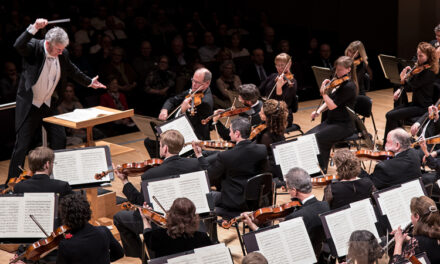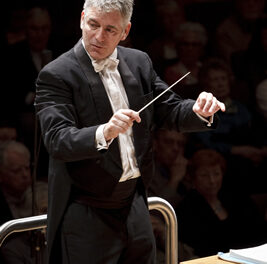Beginning two years ago, the Port City etched another jewel into the rich array of culture offered here: Opera Wilmington. The organization was founded, according to its website, “to provide excellence in operatic performance and education, and to inspire appreciation of the art form within the Wilmington community and surrounding areas.” The current production shows again the group’s great success.
The 2016 presentation – the group’s third – is Mozart’s Così fan tutte. For the first time this year, a two-day symposium was added to the series of performances. This offered extensive insights and knowledge to an interested public ahead of the staged event itself. This performance took place at the Cultural Arts Building’s Main Stage Theater on the campus of University of North Carolina Wilmington.
The preview performance – four official presentations will follow – was filled with artistic delights. Despite a problematic plot, Mozart’s sublime music redeems almost all. And the quality of the performance ranged between high and compelling.
The curtain was open when the audience entered, so the stage was the first impression the viewer received. The set (Max Lydy) was adorned with fan shapes richly painted with 18th-century style motifs, as one would expect to see in paintings or palaces of that period. They were all circular, as were the floor figure on the stage and the tables and chairs of the opening scene. The projection surface for the English supertitles was a semi-circle too, so that the stage put forth an ornate visual unity.
The overture which begins the work showed immediately that the performers in the dynamic scaled-down orchestra (conducted by Joe Hickman) were drawn from among the top-quality musicians in Wilmington, both faculty at the university and others from the professional community. The rapid, exposed wind passages were handled with virtuoso aplomb.
The opera is dominated by a sextet of leading characters. All were strong, giving coherence to the story and vocal projection of the individuals. Nancy King, artistic director of Opera Wilmington, was a nuanced Fiordiligi, the more stalwart of the sisters. Constance Paolantonio gave Dorabella a consistently rich sound. Joshua Collier had real dramatic heft as Ferrando, while also tending to push his voice in higher or louder passages. William Bryan, as Guglielmo, and the other “Albanian” suitors, had a large, full sound, well-matched with his brother in arms. Nathan Strock, the only student among the leads, is already a full-fledged professional and finely inflected his good-natured curmudgeon. Sophie Amelkin was delightful as Despina and at least as good – and quite funny – in her two roles disguised as males. Early weakness in pitch had resolved by the end of the first act.
Many of their arias were standout moments in the performance. Collier, as Ferrando, exuded gentle tenderness over his love for Dorabella in “Un’aura amorosa.” The return to the main melody was especially beautiful. King’s fiery affirmation of fidelity in “Come scoglio” was highly dramatic. So too was Paolantonio’s “Smanie implacabile.” Bryan’s passionate outrage at his lover’s infidelity showed a powerful voice at work, while in “Non siate ritrosi” he paraded virility with a fine strutting quality.
Along with the lyrical high points, there was a of course a good deal of humor. In this production it was handled broadly, one might say in a Shakespearean manner rather than Viennese. It worked very well; these characters knew how to be funny. The antics when the two “Albanians” swallow the “poison” were excellent slapstick, as was the silliness of Amelkin in her male roles. The sisters’ overdramatized reactions to the importuning of the suitors; the suitors’ attempts to make conversation – who would not be reminded of some awkward real-life first date? – and the ridiculous waving of fans during Dorabella’s “smanie” rant, were almost laugh-out-loud funny.
The leads’ ensemble singing was as strong as the solos. The gentle, almost heavenly trio “Soave sia il vento,” was sung in beautiful balance. (Even among the astounding greatness of Mozart’s lyrical writing in Così, this piece stands out for its prescient suggestion of 19th-century sound.) This was uniformly the case in the duets sung by the two sisters, in which their voices blended finely with one another, and ranged up to the great quintet at the “departure” of the soldiers in Act I. These ensembles filled the theatre with resonant, reinforcing tone which seemed larger than the number of people singing. This was noteworthy too because the theatre – not principally designed for music – has a dry acoustic which tends to somewhat mute the sound.
The chorus was strong as well, once again filling the theatre with resonance. The military-style scenes were supported by bright, clear trumpet playing from the pit which helped make these parts musically very effective.
The costumes (Mark Sorensen) were opulent, with texture and color which were a pleasure to the eye. The stage direction (Frank Trimble) gave the visual action smoothness and variety.
Under Hickman, the orchestra supported the singers with varied and nuanced tone. Occasional imprecision of ensemble or intonation will most likely correct itself in the course of the performances; the same might be said for the singers occasionally falling out of full synchrony with the orchestra.
Opera Wilmington is making a great contribution to the region in presenting live opera of high artistic quality. It is a testament to the many people supporting this mission – and to the growing, developing Wilmington public – that it is succeeding splendidly.
This performances officially begin on July 29 and runs through August 7. For ticket information see our sidebar.












